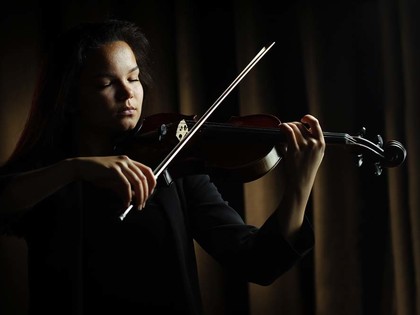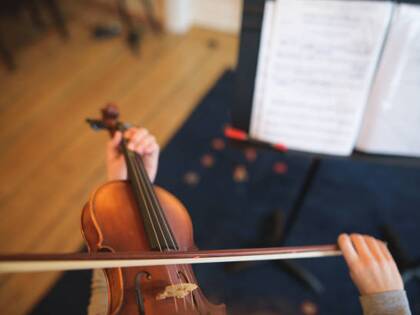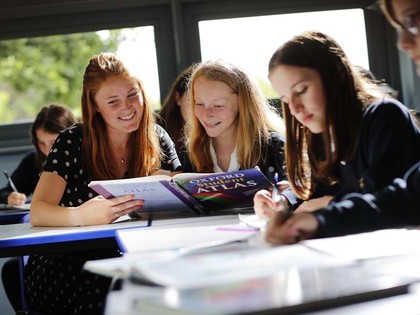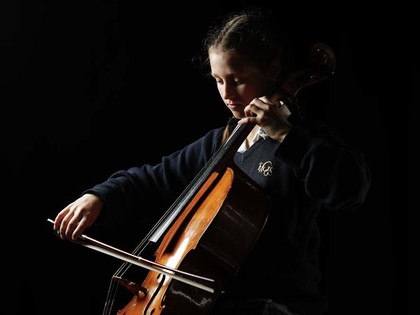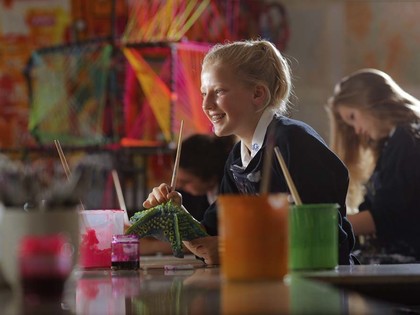Modern Foreign Languages
Back to Subjects Menu- Art
- Biology
- Chemistry
- Computing & Computer Science
- Design & Technology
- Drama
- Economics
- English
- Geography
- History
- Maths
- Modern Foreign Languages
- Music
- PE
- Physics
- Politics
- Psychology
- Religious Studies
- Science
- Sociology
At TWGGS we believe languages are a skill for life and we are passionate about the benefits that learning a language can bring. The learning of different languages is key to allowing pupils to open up to other cultures and gain an understanding of them; they are able to experience and appreciate the riches unique to each language, while learning a number of languages allows pupils to appreciate the common features between them. Language lessons at TWGGS are fast-paced, engaging and fun, and pupils feel confident participating in lessons.
Throughout Key Stage 3, we cover a range of topics based on pupils’ daily lives and tourist situations. Pupils are encouraged to find their preferred method of learning vocabulary and to develop their comprehension skills in listening and reading. Pupils also consolidate core competences in grammatical knowledge with a focus on translation to and from the target language, given the increased focus on this skill in the new GCSE. They also develop their speaking skills so that they can respond spontaneously in everyday situations, preparing them well for their future as well as for the requirements of the new GCSE oral examinations. During language lessons, pupils have an opportunity to learn about cultural components such as geography, history, film, customs and traditions, which bring languages to life.
|
Year 7 |
German and Spanish In Year 7, all pupils start learning German and Spanish and have 3 hours per fortnight in each subject. The main aim of this year is to understand the principles of basic grammar and ensure pupils understand the basic rules of phonetics in both languages as well as starting to get used to learning vocabulary. |
|---|---|
|
Year 8 |
German, Spanish and French Pupils continue to study German and Spanish for 3 hours a fortnight respectively as well as French for 4 hours per fortnight. |
|
Year 9 |
German, Spanish and French The study of all three languages continues in Year 9, with 3 hours of lessons per fortnight in each language. |
Having had the opportunity to study three of the main European languages, TWGGS pupils are able to make an informed decision about which languages they would like to continue at GCSE. The Modern Foreign Language department offers GCSE courses in French, German and Spanish. Pupils are required to study one foreign language as a core subject and may also opt to study a second one. We like to encourage all pupils achieving good results at Key Stage 3 to consider how beneficial it will be for them to carry on studying two languages at GCSE. The department has a history of very good GCSE results and TWGGS pupils enjoy the lively, dynamic and engaging language lessons.
Key Stage 3 German
Pupils at TWGGS start learning German as soon as they arrive in Year 7. We use the textbook ‘Stimmt’ throughout Years 7, 8 and 9. The majority of pupils in Year 7 are beginners to German; for those with previous knowledge we provide additional challenges depending on their level. There is a clear focus on acquisition of vocabulary and new words and phrases are practised through games and songs. Basic grammar is taught so that pupils are able to form their own sentences and, by the end of Year 9, they should be able to express themselves accurately in the past, present and future tenses
|
Year 7 |
Topics Colours, numbers, days of the week and months Myself and my family and pets Describing people and giving opinions Sports and hobbies
|
Grammar Genders of nouns; plurals Present tense verbs: regular and irregular Modal verbs Basic sentence structure Word order with time phrases
|
|---|---|---|
|
Year 8 |
Topics School subjects, the school day, opinions Future and past holidays The weather Media
|
Grammar Introduction to perfect tense with regular and irregular verbs; focus on use of auxiliary verbs Introduction to cases with use of prepositions Word order (verb in second idea) Subordinating conjunctions |
|
Year 9 |
Topics Television and Film
School Trips
Festivals
Food and Healthy Living
Fashion
Daily Routine
Going on a date
|
Grammar Consolidation of the perfect tense Basic use of the imperfect tense Future Tense Subordinating conjunctions at the start of sentences Infinitive clauses Comparative and superlatives The imperative Reflexive and separable verbs Adjective endings |
Key Stage 3 Spanish
Pupils at TWGGS start learning Spanish as soon as they arrive in Year 7. We use the textbooks “Claro 1” and “Claro 2” throughout Years 7 and 8. In the academic year 2021-2022, Year 9 pupils will continue to use “Listos 2”. The majority of pupils in Year 7 are beginners to Spanish; for those with previous knowledge we provide additional challenges depending on their level. There is a clear focus on acquisition of vocabulary and new words and phrases are practised through games and songs. Basic grammar is taught so that pupils are able to form their own sentences and, by the end of Year 9, they should be able to express themselves accurately in the past, present and future tenses.
|
Year 7 |
Topics Colours, numbers, days of the week and months Saying your name, age and birthday Myself and my family and pets Describing people and giving opinions Sports and hobbies My house
|
Grammar Gender of nouns Word order Present tense verbs: regular and irregular including stem-changing verbs Opinion verbs Es vs está Basic sentence structure Intensifiers and time references
|
|---|---|---|
|
Year 8 |
Topics My town School subjects, the school day, opinions on subjects Healthy living Holidays Technology, TV and film
|
Grammar Verb structure: ‘hay’ (there is/there are) Immediate future tense Impersonal: se puede, se debe Introduction to Preterite tense: regular verbs and verb IR
|
|
Year 9 |
Topics Holidays Technology TV and Film Fashion and Shopping My daily routine |
Grammar Preterite Tense most common irregular verbs Demonstrative adjectives Simple Future with regular verbs Conditional with regular verbs
|
Key Stage 3 French
Pupils at TWGGS start learning French in Year 8. We use the textbook “Allez 1” throughout Years 8 and 9. The majority of pupils in Year 8 will have had some exposure to French during primary school; for those with previous knowledge we provide additional challenges depending on their level. There is a focus on acquiring basic vocabulary and key grammar, which provide a solid basis for their future studies of the language, or languages, of their choice. By the end of Year 9, pupils should be able to express themselves accurately in the past, present and future tenses.
|
Year 8 |
Topics Colours, numbers, days of the week and months Describing objects Saying your name, age and birthday Myself and my family and pets Describing people and giving opinions School subjects Food My town and my area Directions |
Grammar Gender of nouns Word order and adjectival agreement Present tense verbs – regular and irregular Etre and Avoir Possessive adjectives Partitive Negative forms Reflexive verbs Near future tense Je voudrais / j’avais / c’était Modal verbs |
|---|---|---|
|
Year 9 |
Topics Weather Going out and clothes Holidays Festivals Free time, Sport and Hobbies Body parts and aches My daily routine Telling time French-speaking countries |
Grammar Perfect tense with avoir and être Revision of adjectival agreement The partitive Structure “il faut” and “avoir besoin de” Comparatives and superlatives Revision and further practice of all 3 time frames Expressions using avoir Depuis + present tense |
GCSE German, Spanish and French
There are many excellent reasons to study a foreign language at GCSE, and you can read more about them here.
Please note, the AQA course is changing from September 2024 for Year 10 pupils. The following specifications are those for current Year 11 pupils, who will finish their GCSE course in Summer 2025:
AQA specification for GCSE German AQA specification for GCSE Spanish AQA specification for GCSE French
Below are the new specifications for Year 10, which replace those above, for first examination in Summer 2026:
*NEW* AQA specification for GCSE German *NEW* AQA specification for GCSE Spanish *NEW* AQA specification for GCSE French
The new AQA GCSE specification for each language is based around familiar, culturally relevant and engaging topics linked to the following contexts:
Theme 1: People and Lifestyle
Topic 1 - Identity and relationships with others
Topic 2 - Healthy living and lifestyle
Topic 3 - Education and work
Theme 2: Popular Culture
Topic 1 - Free-time activities
Topic 2 - Customs, festivals and celebrations
Topic 3 - Celebrity culture
Theme 3: Communication and the world around us
Topic 1 - Travel and tourism, including places of interest
Topic 2 - Media and technology
Topic 3 - The environment and where people live
Pupils are externally assessed at the end of the course in examinations in all four skills of listening, reading, speaking and writing. Each skill carries 25% of the marks. Translation to and from the target language is also assessed in the new qualification, and short (suitably adapted) literary passages from authentic target language texts are included in reading comprehension.
A very good GCSE language qualification is highly regarded by many universities and employers. There are many opportunities for studying a language at university, either on its own or as a complement to virtually any other subject. Universities recognise that communication skills in a foreign language are a huge asset for a large number of careers, including journalism, politics, law, science, engineering, business and the tourism industry.
A Level German
Eduqas specification for A Level German
Many 21st century jobs are international jobs and German is a very sought after business language. One of the aims of the A Level is to provide an opportunity for pupils to broaden their studies and to acquire the different skills required by many employers. Studying German in the Sixth Form helps to develop communication skills, teamwork and independence. Many of the pupils at TWGGS go on to spend part of their education and/or career in other European states. A sound knowledge of one or several languages is increasingly important for their future. Whatever choice of career pupils wish to embark upon, be it in the travel industry, media, business, working for an international organisation or in banking, the study of German in particular at A Level, will enhance their prospects.
Teaching is shared by a teacher at The Skinners’ School and a TWGGS teacher, who use a variety of techniques and also encourage pupils to become independent learners and develop habits of listening and reading authentic resources. We aim to provide an additional conversation lesson with a native speaker to further develop their speaking skills.
Theme 1: Social Issues and Trends: Being a young person in German-speaking society
- Families and citizenship: Changing family structures; the changing nature of marriage and partnership; being a good citizen.
- Youth trends and personal identity: Trends in fashion; how young people respond to modern technology; relationships with others and peer pressure.
- Education and employment opportunities: The education system and student issues; work and travel opportunities and the changing work scene.
Theme 2: Political, Intellectual and Artistic Culture: Understanding the German-speaking world
-
Regional culture and heritage in Germany, German-speaking countries and communities: Festivals; customs and traditions; historical sites; museums and galleries.
Theme 3: Diversity and Difference
-
Migration and integration: Reasons for migration; factors which make migration/integration easy/difficult
-
Cultural identity and marginalisation: Reasons for marginalisation; ways to eliminate marginalisation
-
Cultural enrichment and celebrating difference: The positive aspects of a diverse society
-
Discrimination and diversity: Life for those who are discriminated against
- Initial and subsequent process of reunification: Social and political challenges linked to reunification; the events of autumn 1989.
- Social cohesion in present-day Germany: Social and community challenges facing contemporary Germany.
- The economic impact of a united Germany: The economic advantages and challenges linked to reunification.
|
Component 1 |
Speaking 30% of A Level Task 1 (presentation and discussion on independent research project) Pupils present a summary of the key findings of written sources used for their research, answer questions and have a wider discussion. Task 2 (Theme-based discussion) Pupils take part in a discussion based on a stimulus card comprising an image, a short text and a point for consideration. This paper draws on vocabulary and structures across all four themes. |
|---|---|
|
Component 2 |
Listening, Reading and Translation 50% of A Level This paper draws on vocabulary and structures across all four themes. |
|
Component 3 |
Critical and analytical response in writing 30% of A Level Pupils will undertake the in-depth study of one film and one literary text and will write two essays of approximately 300 words each. |
*Also offered as an AS Level, spaces permitting.
A Level Spanish
Eduqas specification for A Level Spanish
Studying Spanish in the Sixth Form helps to develop communication skills, teamwork and independence. The specification is designed to build on the knowledge, understanding and skills specified for GCSE. Many of the pupils at TWGGS go on to spend part of their education and/or career in Spain or Latin American countries. A sound knowledge of one or several languages is increasingly important for whatever choice of career pupils wish to embark upon. Be it in the travel industry, media, business, working for an international organisation or in banking, the study of languages, at A Level, will enhance their prospects.
Teaching is usually shared by two members of staff in each year group, who use a variety of techniques and also encourage pupils to become independent learners and develop habits of listening and reading authentic resources. We aim to provide an additional conversation lesson with a native speaker to further develop their speaking skills.
Theme 1: Social Issues and Trends: Being a young person in Spanish-speaking society
-
Families and citizenship: Changing family structures; the changing nature of marriage and partnership; being a good citizen
-
Youth trends and personal identity: Trends in fashion; how young people respond to modern technology; relationships with others and peer pressure
-
Education and employment opportunities: The education system and student issues; work and travel opportunities and the changing work scene
Theme 2: Political, Intellectual and Artistic Culture: Understanding the Spanish-speaking world
-
Regional culture and heritage in Spain, Spanish-speaking countries and communities: Festivals; customs and traditions; historical sites; museums and galleries
-
Media, art, film and music in the Spanish-speaking world: Trends in media and art; film and music in the lives of young people
Theme 3: Diversity and difference
-
Migration and integration: Reasons for migration; factors which make migration/integration easy/difficult
-
Cultural identity and marginalisation: Reasons for marginalisation; ways to eliminate marginalisation
-
Cultural enrichment and celebrating difference: The positive aspects of a diverse society
-
Discrimination and diversity: Life for those who are discriminated against
Theme 4: The Two Spains: 1936 onwards
-
El franquismo: Origins, development and consequences
-
Post-Civil War Spain – historical and political repercussions: Control, repression and daily life in Franco's Spain
-
Spain – coming to terms with the past?: "Recuperación de la memoria histórica"; attempts to deal with the past; 'los desaparecidos'; removing the symbols of Franco's Spain
|
Component 1 |
Speaking 30% of A Level Task 1 (presentation and discussion on independent research project) Pupils present a summary of the key findings of written sources used for their research, answer questions and have a wider discussion. Task 2 (Theme-based discussion) Pupils take part in a discussion based on a stimulus card comprising an image, a short text and a point for consideration This paper draws on vocabulary and structures across all four themes. |
|---|---|
|
Component 2 |
Listening, Reading and Translation 50% of A Level This paper draws on vocabulary and structures across all four themes. |
|
Component 3 |
Critical and analytical response in writing 30% of A Level Pupils will undertake the in-depth study of one film and one literary text and will write two essays of approximately 300 words each. |
*Also offered as an AS Level, spaces permitting.
A Level French
Eduqas specification for A Level French
Studying French in the Sixth Form helps to develop a high level of communication and comprehension skills, together with an awareness of various aspects of society in the countries where the language is spoken. It also promotes teamwork and independence and provides a suitable foundation for the study of the subject in higher education or provides direct entry into employment. Whatever choice of career pupils wish to embark upon, the study of French at A Level will enhance their prospects.
Teaching is usually shared by two members of staff in each year group, who use a variety of techniques and also encourage pupils to become independent learners and develop habits of listening and reading authentic resources. We aim to provide an additional conversation lesson with a native speaker to further develop their speaking skills.
Theme 1: Social Issues and Trends: Being a young person in French-speaking society
-
Families and citizenship: Changing family structures; the changing nature of marriage and partnership; being a good citizen
-
Youth trends and personal identity: Trends in fashion; how young people respond to modern technology; relationships with others and peer pressure
-
Education and employment opportunities: The education system and student issues; work and travel opportunities and the changing work scene
Theme 2: Political, intellectual and artistic culture: Understanding the French-speaking world
-
Regional culture and heritage in France, French-speaking countries and communities: Festivals; customs and traditions; historical sites; museums and galleries
-
Media, art, film and music in the French-speaking world: Trends in media and art; film and music in the lives of young people
Theme 3: Diversity and difference
-
Migration and integration: Reasons for migration; factors which make migration/integration easy/difficult
-
Cultural identity and marginalisation: Reasons for marginalisation; ways to eliminate marginalisation
-
Cultural enrichment and celebrating difference: The positive aspects of a diverse society
-
Discrimination and diversity: Life for those who are discriminated against
Theme 4: France 1940-1950: The Occupation and post-war years
-
June 1940–May 1945: Life in occupied France; the French Resistance
-
The cultural dimension in occupied France: The political context of theatre and cinema productions
-
1945-1950: Rebuilding and restructuring society in post-war years
|
Component 1 |
Speaking 30% of A Level Task 1 (presentation and discussion on independent research project) Pupils present a summary of the key findings of written sources used for their research, answer questions and have a wider discussion. Task 2 (Theme-based discussion) Pupils take part in a discussion based on a stimulus card comprising an image, a short text and a point for consideration. This paper draws on vocabulary and structures across all four themes. |
|---|---|
|
Component 2 |
Listening, Reading and Translation 50% of A Level This paper draws on vocabulary and structures across all four themes. |
|
Component 3 |
Critical and analytical response in writing 30% of A Level Pupils will undertake the in-depth study of one film and one literary text and will write two essays of approximately 300 words each. |
*Also offered as an AS Level, spaces permitting.
| Subject Documents | Date | |
|---|---|---|
| Why study Modern Foreign Languages.pdf | 18th Jul 2019 | Download |




